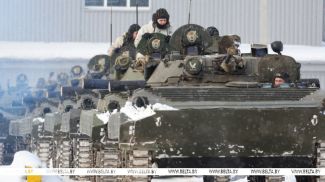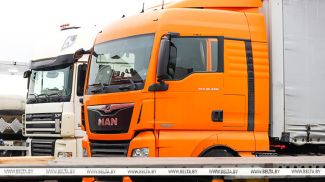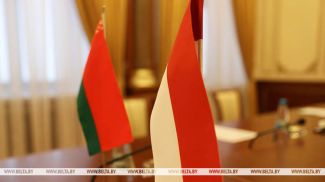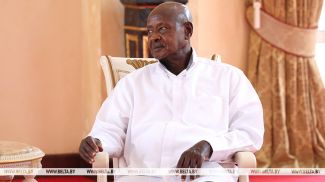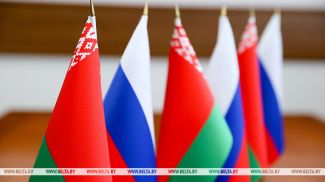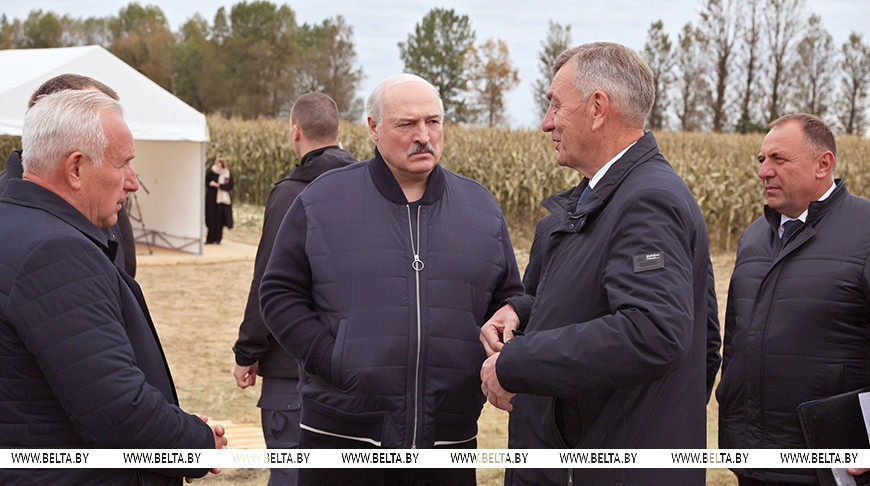
On 27 September, Belarusian President Aleksandr Lukashenko visited the eastern part of the country, the regions requiring special attention. Following his trip to Moscow and intensive negotiations with Russian leader Vladimir Putin, the head of state traveled to Shklov District of Mogilev Oblast and toured the agricultural enterprise Gorodets that he managed back in the day and transformed a struggling farm into a prosperous and stable operation. What did the president see on-site that unpleasantly surprised him? What, conversely, pleased him? What overarching tasks did the head of state set for the region and the country as a whole? All details of the president's working visit are in BelTA's coverage."<
“Without discipline, nothing will work. Money earned through hard labor will be wasted without discipline,” the president said.
The head of state tasked the head of ASB-Agro Gorodets, local authorities, and the leadership of the Belarus President Property Management Directorate with restoring perfect order by spring. “There is an opportunity to have a good enterprise here,” Aleksandr Lukashenko stated.
Of course, one could argue that the soil quality here is not the same as in other regions, but under modern conditions, this cannot be considered a determining factor. With a proper level of executive and technological discipline, it is quite realistic to harvest good yields.
“I won't say we're super-rich. But in Belarus, those who want to earn money they have all the opportunities to earn it. Not just from working the land,” the Belarusian leader said.
All the local residents and enterprise workers present concurred with the head of state. Those who had once worked here under Aleksandr Lukashenko's leadership also noted that the working conditions have improved much recently. In the past, in the opinion of many, it was much more difficult, but people still worked and strived to improve things.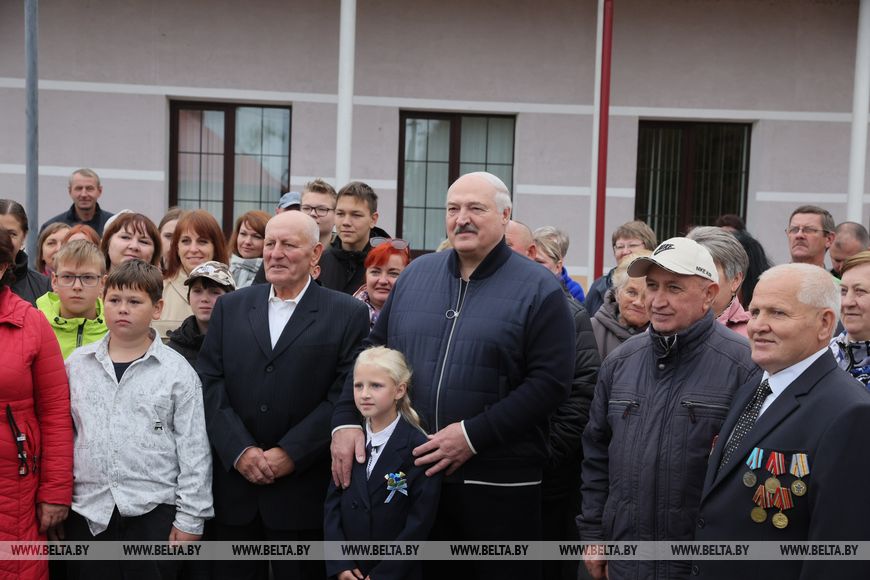 “When I came here, this farm was the worst in the Soviet Union. No one was there to make things easy for us. We did it by ourselves, by our own efforts,” the president remarked. He added that today young generation expects state support in such personal matters as having children, rather than relying primarily on themselves.
“When I came here, this farm was the worst in the Soviet Union. No one was there to make things easy for us. We did it by ourselves, by our own efforts,” the president remarked. He added that today young generation expects state support in such personal matters as having children, rather than relying primarily on themselves.
The president remarked that the state had done much to create living conditions for people and social infrastructure. “How would you live if the state hadn't helped? I'm saying that you have a debt to repay (in the form of responsible work for your own future and the future of your country),” the Belarusian leader added.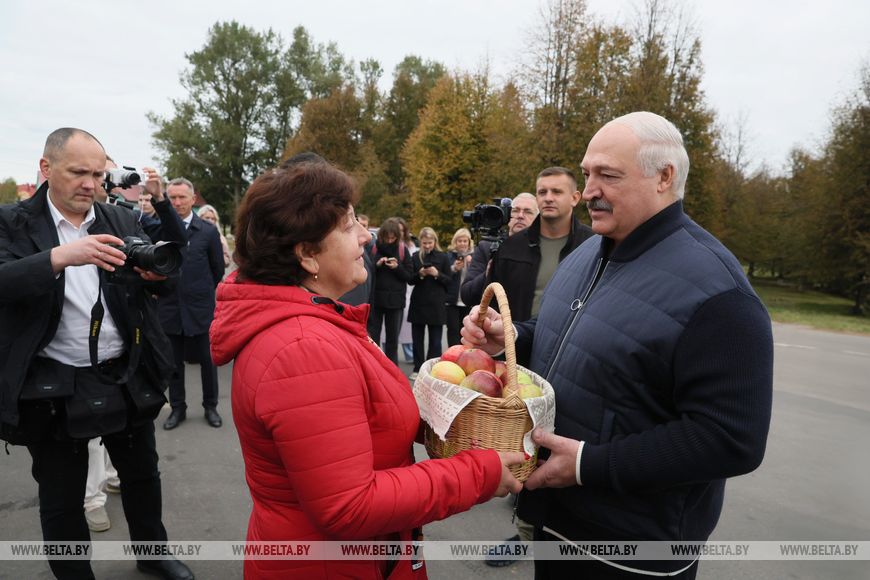 “It is better to work the land than to fight a war,” the head of state said. “Therefore, let’s work hard to build a strong economy. Iron discipline is important too. We must create a system where everyone is disciplined: when something is said, it must be done. Nothing more is needed. This will suffice.”
“It is better to work the land than to fight a war,” the head of state said. “Therefore, let’s work hard to build a strong economy. Iron discipline is important too. We must create a system where everyone is disciplined: when something is said, it must be done. Nothing more is needed. This will suffice.”
A serious conversation in the fields
Another stop on the presidential itinerary was a cornfield of ASB-Agro Gorodets where Aleksandr Lukashenko inquired about the corn harvest prospects. According to Agriculture and Food Minister Yuri Gorlov, corn has been planted on approximately 1.3 million hectares, with the majority being harvested for silage. The grain corn harvest is projected to be around 2.2 million tonnes.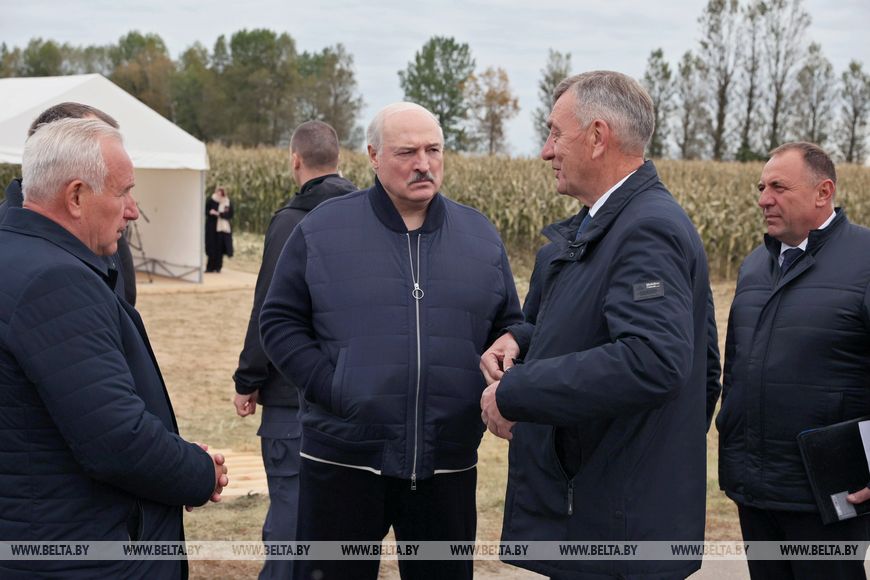 “So, 2.2 million tonnes is the minimum we can get?” the president clarified and received an affirmative answer. “In short, we are looking at 2.2 to 2.5 million tonnes of grain.”
“So, 2.2 million tonnes is the minimum we can get?” the president clarified and received an affirmative answer. “In short, we are looking at 2.2 to 2.5 million tonnes of grain.”
The minister confirmed that, after the necessary additional processing, this corn grain would be used as feed for cattle, pigs, and poultry. “Overall, we set our sights on 3 million tonnes of corn grain,” Yuri Gorlov noted.
“So, with proper technology, we can easily reach 3 million tons. That's the goal we should aim for. Consider it a goal you've set for yourself for the future,” the president said.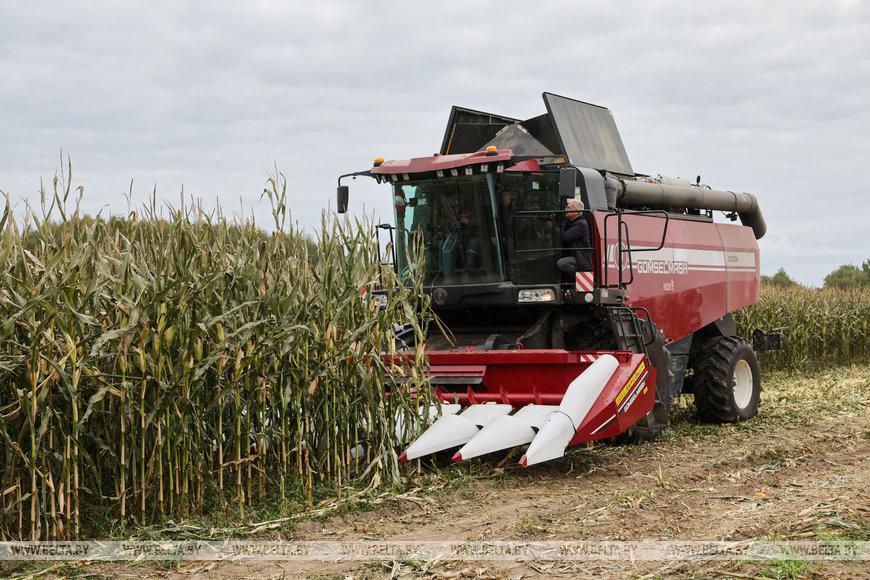 Another topic of discussion was the cultivation of the important agricultural crop, namely sugar beet. The discussion touched on the optimal acreage for it. The issue is particularly acute given that sugar plants that are located in the west or center of the country primarily work with nearby regions. Transporting sugar beet to, for example, Gorodeya is a challenge. The president proposed a solution.
Another topic of discussion was the cultivation of the important agricultural crop, namely sugar beet. The discussion touched on the optimal acreage for it. The issue is particularly acute given that sugar plants that are located in the west or center of the country primarily work with nearby regions. Transporting sugar beet to, for example, Gorodeya is a challenge. The president proposed a solution.
“Let's analyze the situation. We have four sugar mills in the central and western parts of the country. Here, in the east, there are none. But if we see the prospects, a small factory could be built here. We know how to do this; it's not a sophisticated facility,” the head of state said. However, he added, there must be a clear understanding that this mill will have a reliable supply of sugar beets.
The instruction to restore order applies equally to all facilities of the enterprise, including the machinery yard, the dairy complex, and the agricultural plots. It was about the land that the president spoke most passionately. Being the former head of this farming enterprise, he found it difficult to remain indifferent to the current state of some sections of the fertile land. This especially applies the remote areas of Shklov District away from main roads (for example, near the village of Krivel), which the president visited by going off from the pre-planned route.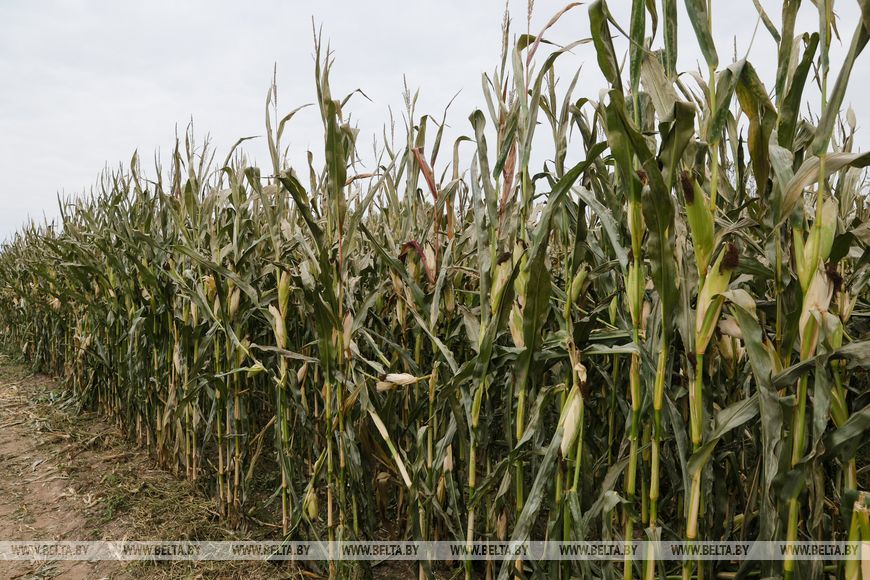
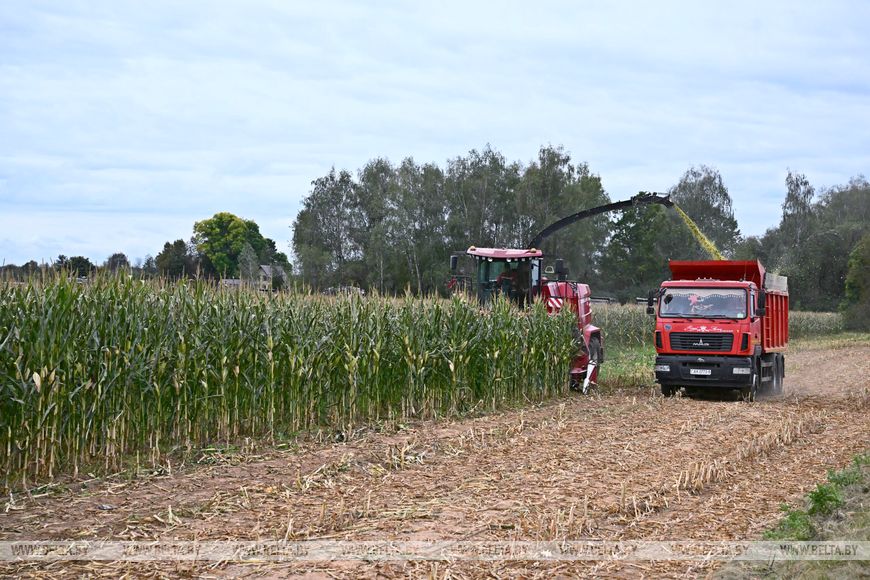 In addition to the mismanagement of the land, the head of state drew attention to the disorder in the forest – windfall still has not been cleared. He demanded that it be cleaned up before it rots and processed appropriately, especially since the state allocates significant financial resources to the wood processing industry.
In addition to the mismanagement of the land, the head of state drew attention to the disorder in the forest – windfall still has not been cleared. He demanded that it be cleaned up before it rots and processed appropriately, especially since the state allocates significant financial resources to the wood processing industry.
“If we don't restore order, we'll be going hungry!” Aleksandr Lukashenko warned of the potential consequences of mismanagement across the country.
The president reiterated his thesis that the economy is the foundation of everything. "Give me, as I say, a strong economy and I will handle the rest myself,” he said. “We need to put the country in order. At least the agro-towns, former farm centers, and large villages.”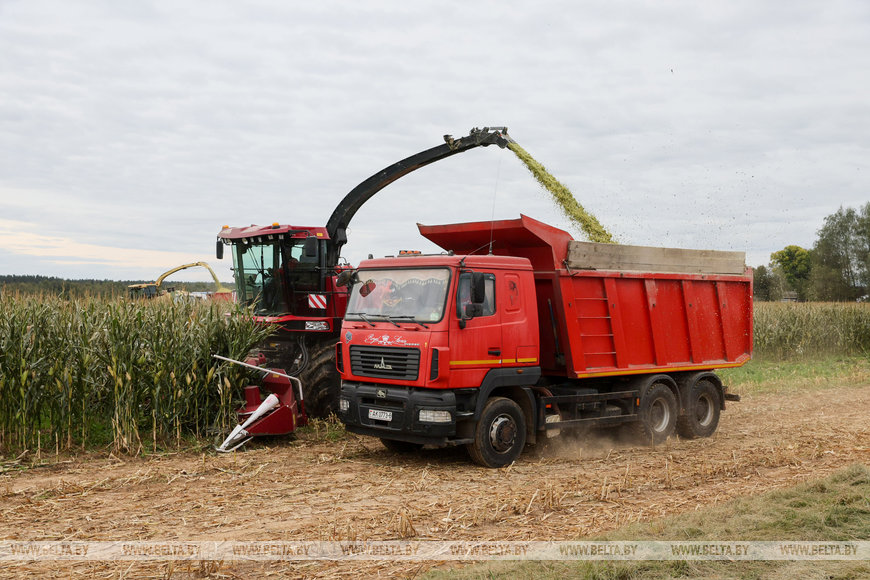 Lukashenko inspects agricultural drones over cornfield
Lukashenko inspects agricultural drones over cornfield
The head of state was shown the drone-assisted desiccation technology. This pre-harvest plant drying process minimizes losses and optimizes harvesting. Drones enable application of desiccants on wet soil for rapeseed, sunflower, corn, soybeans, grain and leguminous crops.
The desiccation technology has a number of advantages. Modern agricultural drones guarantee precision treatment without damaging crops, which helps reduce the time before harvesting and improve the quality of the yield. Thanks to their maneuverability and compact size, drones can reach places that are inaccessible to traditional machinery.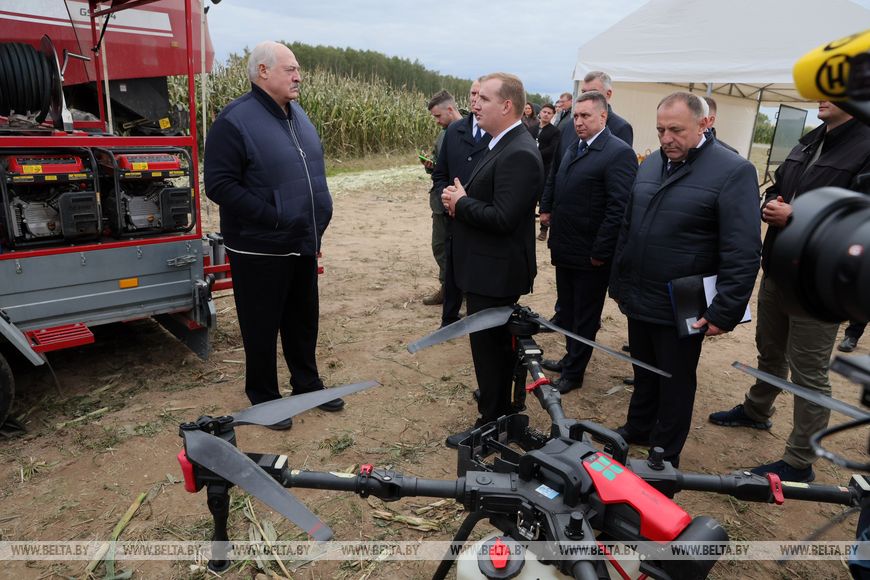
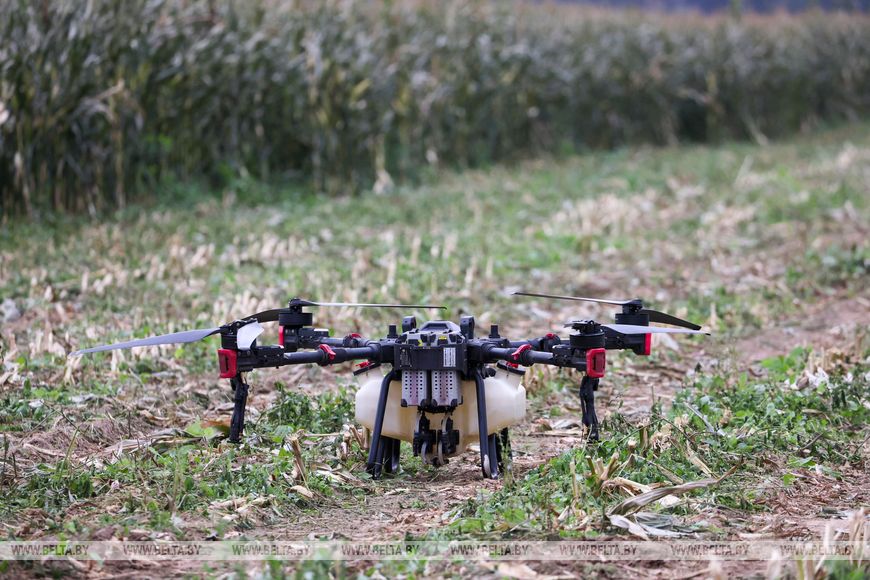 The head of state asked specialists about the performance characteristics of the drone, including its battery life. He also asked for the opinion of Deputy Head of the Belarus President Property Management Directorate Nikolai Sherstnev, an experienced agricultural specialist. He called it a wonderful technology.
The head of state asked specialists about the performance characteristics of the drone, including its battery life. He also asked for the opinion of Deputy Head of the Belarus President Property Management Directorate Nikolai Sherstnev, an experienced agricultural specialist. He called it a wonderful technology.
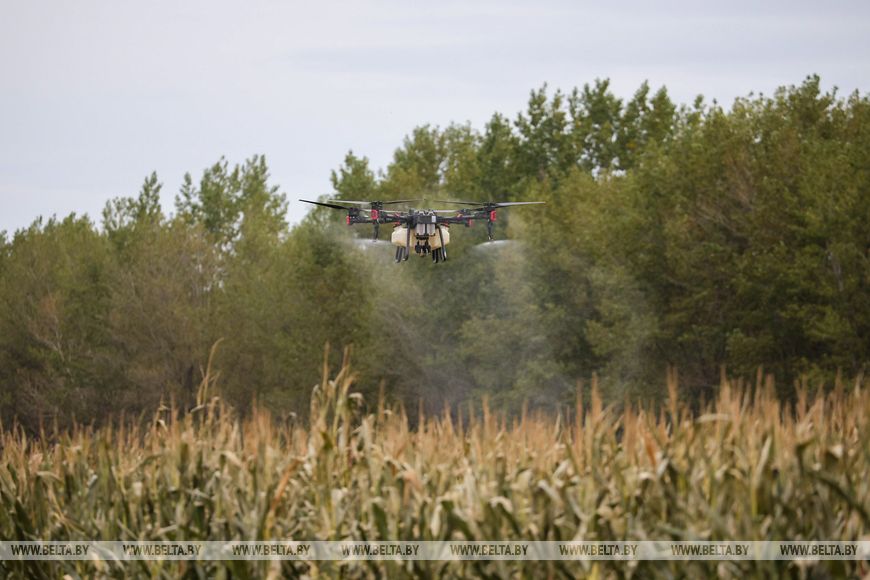 “You can apply anything, not just desiccants,” the president said.
“You can apply anything, not just desiccants,” the president said.
Aleksandr Lukashenko also commented on the desiccation technology in general. According to him, this area needs to be developed if it is truly promising.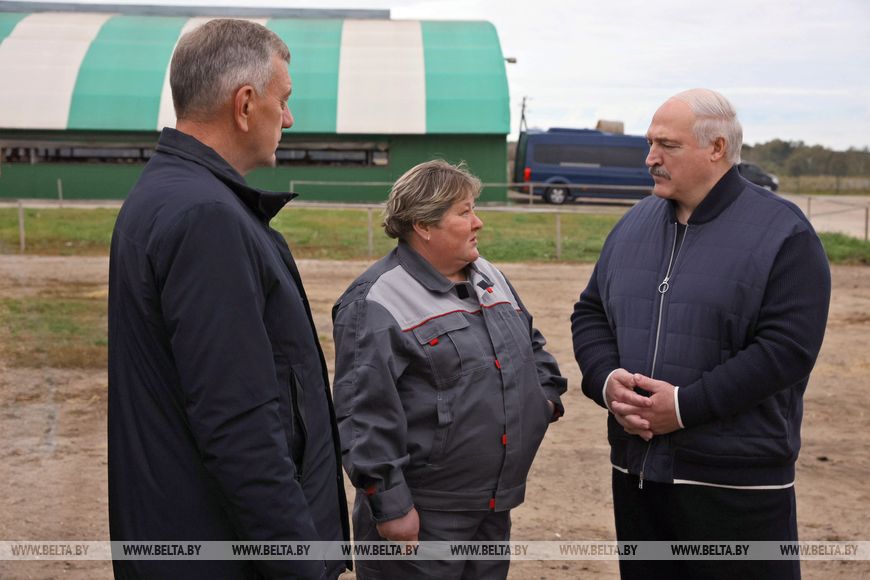
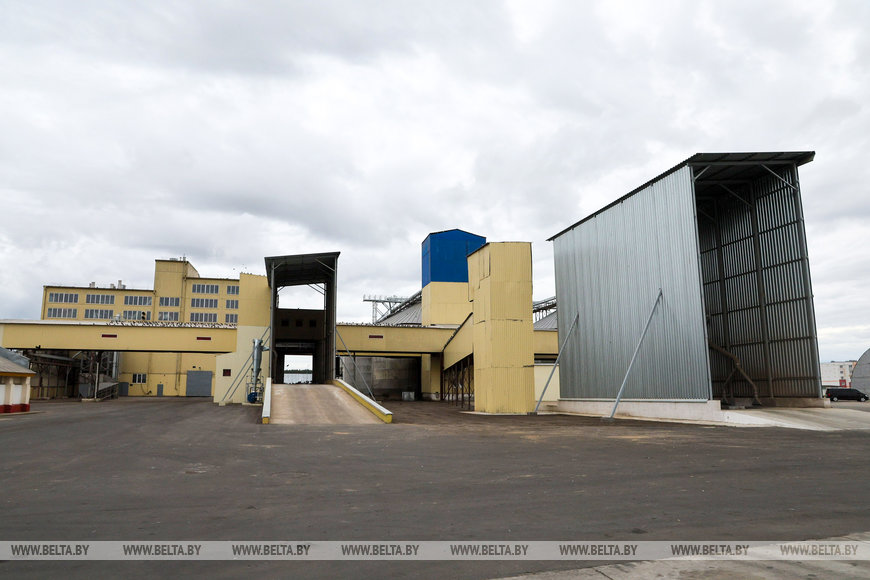
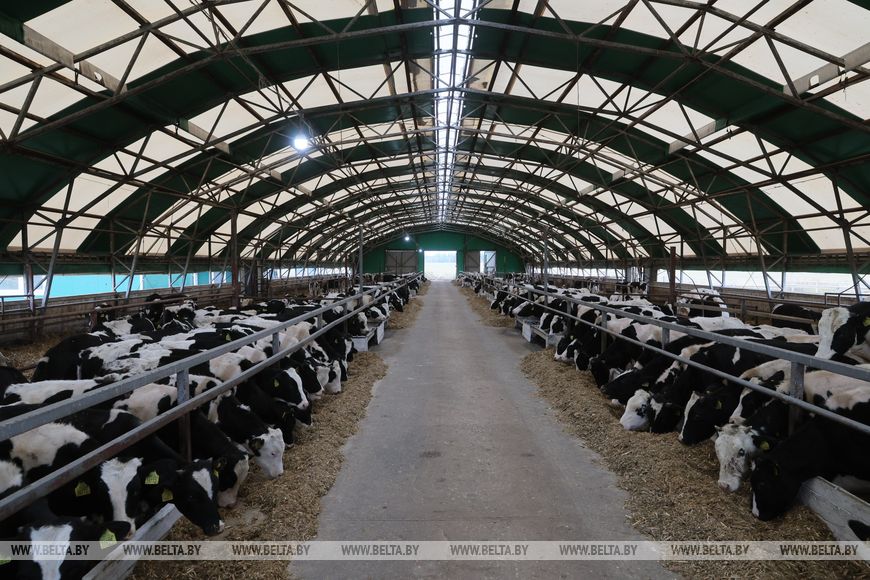 Lukashenko commends new feed mill project in Shklov
Lukashenko commends new feed mill project in Shklov
“Very efficiently. Way to go,” Aleksandr Lukashenko remarked.
The president zeroed in on the mill’s raw material supply and profitability and urged the need to strike a reasonable balance between the interests of the enterprise itself (which would prefer to purchase grain at lower prices) and suppliers seeking maximum revenue for their products. “Don't rip off people,” the president asked the director of the mill. “Do not hurt producers either.”
"The modernization of the administrative complex on the grounds is now nearing completion. It will include a café that will be open to everyone. “You've done everything nicely. If there is something else you need to do, perhaps we might help with some things. If something is good for people, if it generates income, it should be done,” the head of state said.
“Everything looks nicely,” the president said. “Unlike Gorodets, this complex looks decent. It's done wisely. Perfectly.”

First impressions and revelations about dreams
The first stop of the president’s visit was the machine yard of ZAO ASB-Agro Gorodets. The head of state gave a critical assessment of the situation, citing issues with the storage facilities for vehicles, farm machinery, and spare parts, and the poor state of the equipment itself. Aleksandr Lukashenko pointed out mismanagement and disorder, stating that this negatively characterizes not only the performance of the company’s leadership but also the shortcomings of the Shklov District administration and the Belarus President Property Management Directorate, which oversees Gorodets. All this resulted in the degradation of the enterprise, which has now become one of the poorest performers, if not the absolute worst. “Sad, of course. This is the worst farm I have seen in the last two years,” the president noted.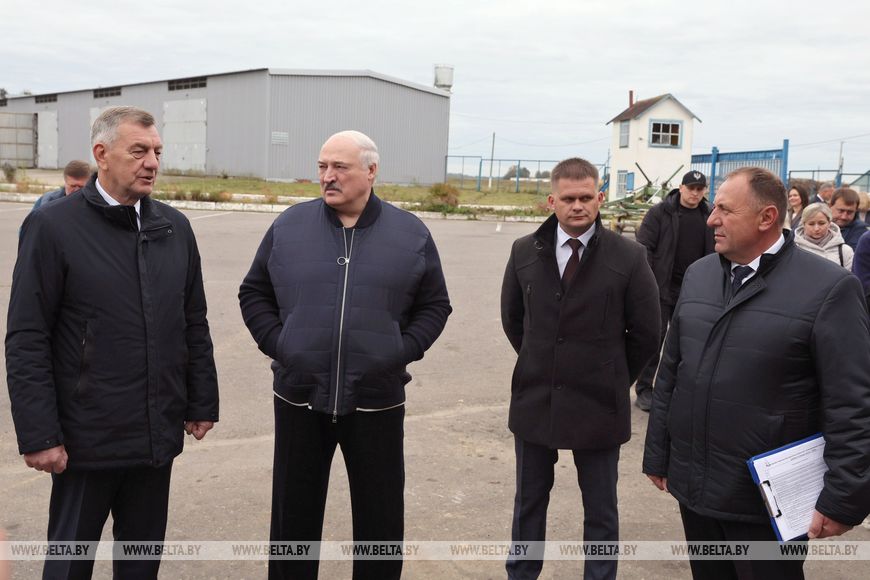
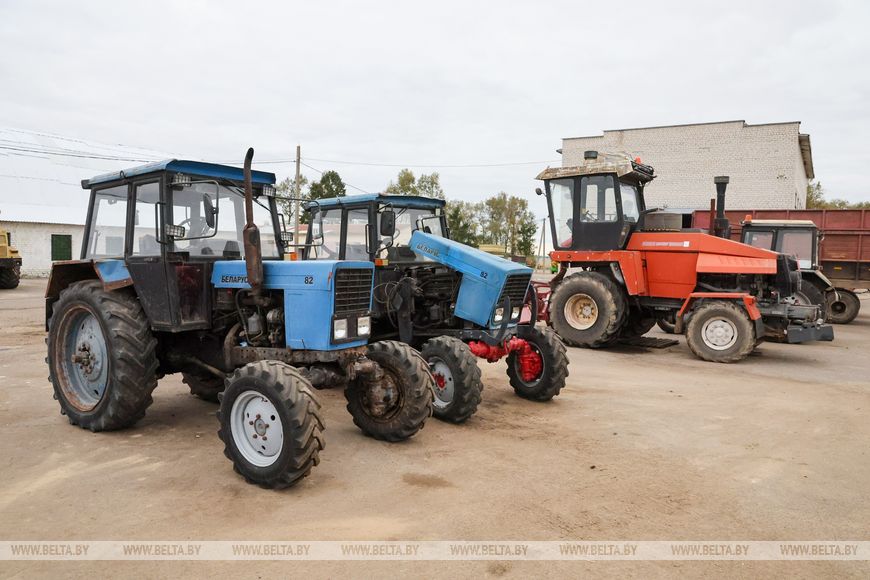 However, these words largely referred to the organization of work and simple mismanagement, which should have been eliminated long ago. Moreover, this should have been done long before the president's visit.
However, these words largely referred to the organization of work and simple mismanagement, which should have been eliminated long ago. Moreover, this should have been done long before the president's visit.
The first stop of the president’s visit was the machine yard of ZAO ASB-Agro Gorodets. The head of state gave a critical assessment of the situation, citing issues with the storage facilities for vehicles, farm machinery, and spare parts, and the poor state of the equipment itself. Aleksandr Lukashenko pointed out mismanagement and disorder, stating that this negatively characterizes not only the performance of the company’s leadership but also the shortcomings of the Shklov District administration and the Belarus President Property Management Directorate, which oversees Gorodets. All this resulted in the degradation of the enterprise, which has now become one of the poorest performers, if not the absolute worst. “Sad, of course. This is the worst farm I have seen in the last two years,” the president noted.

 However, these words largely referred to the organization of work and simple mismanagement, which should have been eliminated long ago. Moreover, this should have been done long before the president's visit.
However, these words largely referred to the organization of work and simple mismanagement, which should have been eliminated long ago. Moreover, this should have been done long before the president's visit.
In general, Gorodets still has development potential. And now it is important for everyone to mobilize and rectify the situation. The president repeatedly emphasized this during his working visit, both in conversations with officials and with local residents.
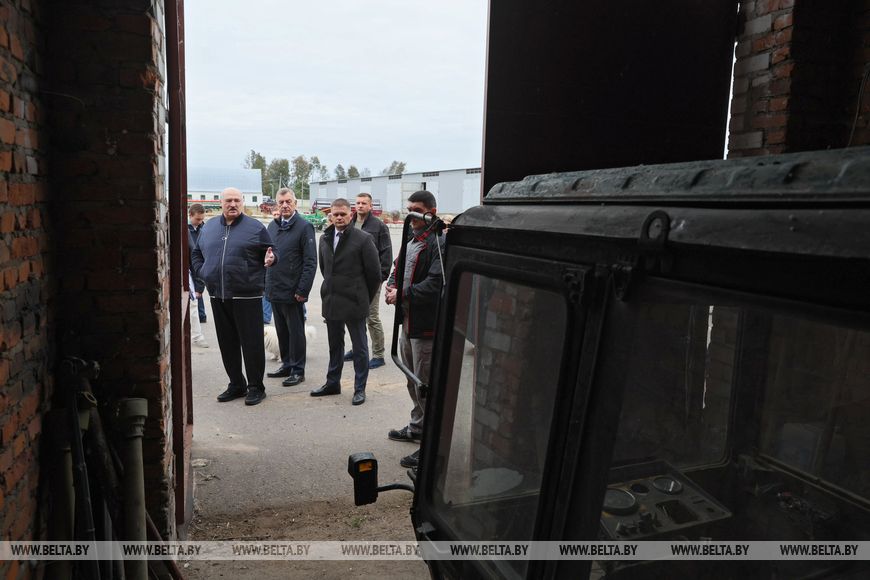
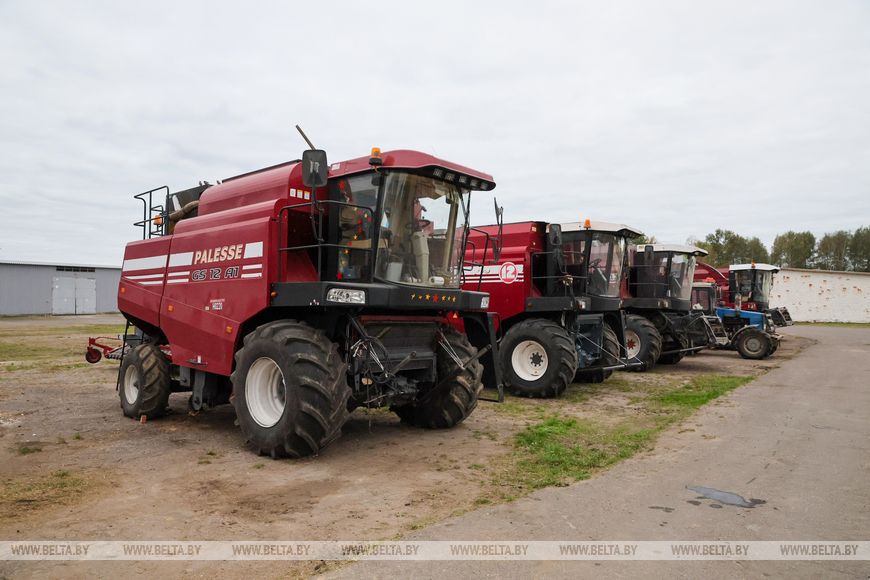 Incidentally, upon learning of the president's arrival, local residents and workers of the enterprise gathered near the engine yard in hopes of speaking with the head of state. Aleksandr Lukashenko warmly greeted everyone and recognized some of those he had worked with during his time at Gorodets.
Incidentally, upon learning of the president's arrival, local residents and workers of the enterprise gathered near the engine yard in hopes of speaking with the head of state. Aleksandr Lukashenko warmly greeted everyone and recognized some of those he had worked with during his time at Gorodets.

 Incidentally, upon learning of the president's arrival, local residents and workers of the enterprise gathered near the engine yard in hopes of speaking with the head of state. Aleksandr Lukashenko warmly greeted everyone and recognized some of those he had worked with during his time at Gorodets.
Incidentally, upon learning of the president's arrival, local residents and workers of the enterprise gathered near the engine yard in hopes of speaking with the head of state. Aleksandr Lukashenko warmly greeted everyone and recognized some of those he had worked with during his time at Gorodets.
In an open conversation, the president noted that he often remembers those days and even dreams about his work at Gorodets, which is why he had long wanted to visit and see the state of affairs on the ground. “Last year it didn’t work out. It didn’t the first half of this year either. But this time, I thought, since I’m flying from Moscow, I’ll land and stop by to see things for myself. Maybe I will stop having dreams of this,” Aleksandr Lukashenko said with a touch of humor.
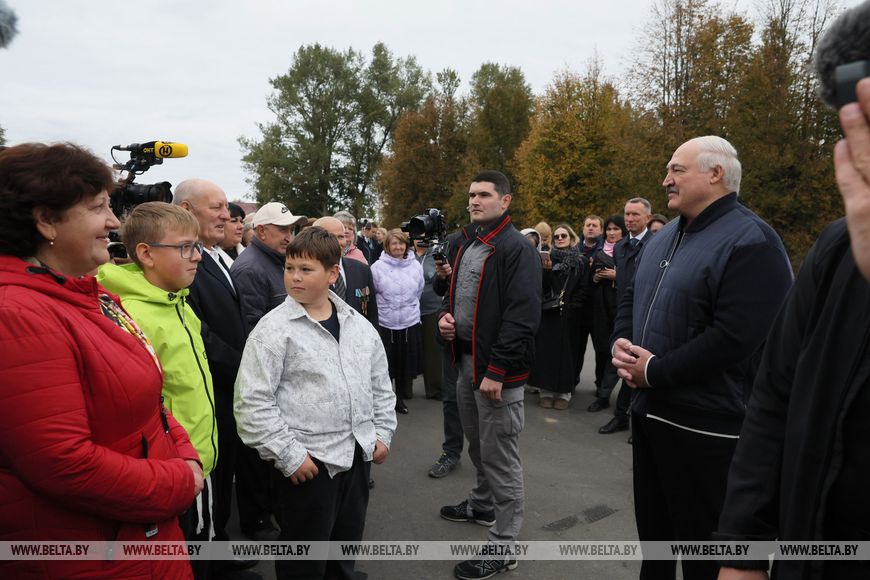
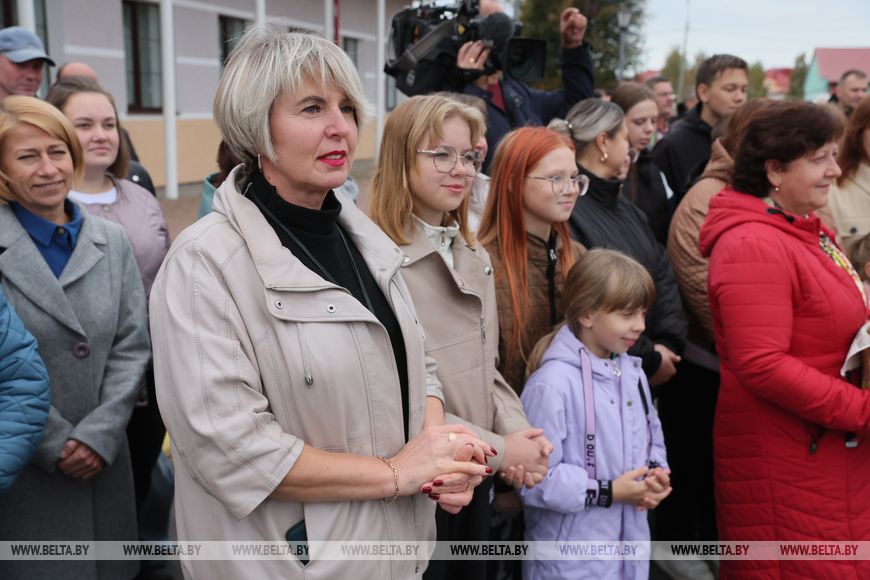
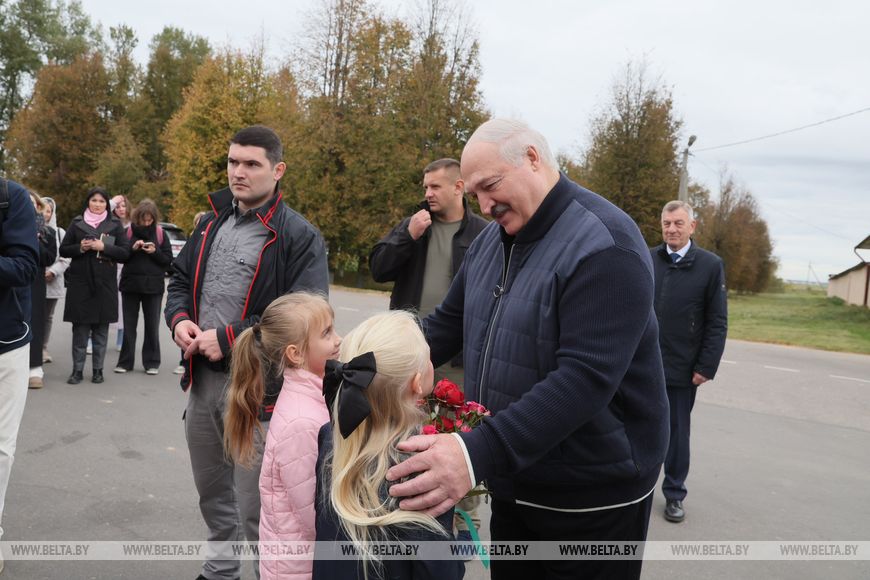



ASB-Agro Gorodets success formula: discipline and decisive action
Continuing the discussion about the problems of the enterprise and their causes, the president stressed that the team lacks discipline first and foremost, starting with the head of the enterprise himself. “Discipline is important. There is no discipline here today,” the president said. “A leader must be strong-willed and persistent.”
Continuing the discussion about the problems of the enterprise and their causes, the president stressed that the team lacks discipline first and foremost, starting with the head of the enterprise himself. “Discipline is important. There is no discipline here today,” the president said. “A leader must be strong-willed and persistent.”
The president directed local officials and the new young manager of the enterprise to be stricter with personnel. Rather than passively waiting for results, they should actively reward good work and penalize those who allow shortcomings financially. “The system must function with clear accountability: you are responsible for this and you for that. We need to make people more proactive,” Aleksandr Lukashenko emphasized.
“Without discipline, nothing will work. Money earned through hard labor will be wasted without discipline,” the president said.
The head of state tasked the head of ASB-Agro Gorodets, local authorities, and the leadership of the Belarus President Property Management Directorate with restoring perfect order by spring. “There is an opportunity to have a good enterprise here,” Aleksandr Lukashenko stated.
Of course, one could argue that the soil quality here is not the same as in other regions, but under modern conditions, this cannot be considered a determining factor. With a proper level of executive and technological discipline, it is quite realistic to harvest good yields.
Moreover, Belarus has vast experience in developing its agro-industrial complex and already exports this expertise abroad. A recent example is Zimbabwe, where, thanks to Belarusian agricultural machinery and technology transfer, the country has managed to ensure its food security for the first time in many years and harvest more than enough wheat for its own needs. The leadership of Zimbabwe now regularly expresses gratitude to the Belarusian side: “Thank you, we have fed our people.”
“I won't say we're super-rich. But in Belarus, those who want to earn money they have all the opportunities to earn it. Not just from working the land,” the Belarusian leader said.
All the local residents and enterprise workers present concurred with the head of state. Those who had once worked here under Aleksandr Lukashenko's leadership also noted that the working conditions have improved much recently. In the past, in the opinion of many, it was much more difficult, but people still worked and strived to improve things.
 “When I came here, this farm was the worst in the Soviet Union. No one was there to make things easy for us. We did it by ourselves, by our own efforts,” the president remarked. He added that today young generation expects state support in such personal matters as having children, rather than relying primarily on themselves.
“When I came here, this farm was the worst in the Soviet Union. No one was there to make things easy for us. We did it by ourselves, by our own efforts,” the president remarked. He added that today young generation expects state support in such personal matters as having children, rather than relying primarily on themselves.
The president remarked that the state had done much to create living conditions for people and social infrastructure. “How would you live if the state hadn't helped? I'm saying that you have a debt to repay (in the form of responsible work for your own future and the future of your country),” the Belarusian leader added.
 “It is better to work the land than to fight a war,” the head of state said. “Therefore, let’s work hard to build a strong economy. Iron discipline is important too. We must create a system where everyone is disciplined: when something is said, it must be done. Nothing more is needed. This will suffice.”
“It is better to work the land than to fight a war,” the head of state said. “Therefore, let’s work hard to build a strong economy. Iron discipline is important too. We must create a system where everyone is disciplined: when something is said, it must be done. Nothing more is needed. This will suffice.”
A serious conversation in the fields
Another stop on the presidential itinerary was a cornfield of ASB-Agro Gorodets where Aleksandr Lukashenko inquired about the corn harvest prospects. According to Agriculture and Food Minister Yuri Gorlov, corn has been planted on approximately 1.3 million hectares, with the majority being harvested for silage. The grain corn harvest is projected to be around 2.2 million tonnes.
 “So, 2.2 million tonnes is the minimum we can get?” the president clarified and received an affirmative answer. “In short, we are looking at 2.2 to 2.5 million tonnes of grain.”
“So, 2.2 million tonnes is the minimum we can get?” the president clarified and received an affirmative answer. “In short, we are looking at 2.2 to 2.5 million tonnes of grain.”
The minister confirmed that, after the necessary additional processing, this corn grain would be used as feed for cattle, pigs, and poultry. “Overall, we set our sights on 3 million tonnes of corn grain,” Yuri Gorlov noted.
“So, with proper technology, we can easily reach 3 million tons. That's the goal we should aim for. Consider it a goal you've set for yourself for the future,” the president said.
 Another topic of discussion was the cultivation of the important agricultural crop, namely sugar beet. The discussion touched on the optimal acreage for it. The issue is particularly acute given that sugar plants that are located in the west or center of the country primarily work with nearby regions. Transporting sugar beet to, for example, Gorodeya is a challenge. The president proposed a solution.
Another topic of discussion was the cultivation of the important agricultural crop, namely sugar beet. The discussion touched on the optimal acreage for it. The issue is particularly acute given that sugar plants that are located in the west or center of the country primarily work with nearby regions. Transporting sugar beet to, for example, Gorodeya is a challenge. The president proposed a solution.
“Let's analyze the situation. We have four sugar mills in the central and western parts of the country. Here, in the east, there are none. But if we see the prospects, a small factory could be built here. We know how to do this; it's not a sophisticated facility,” the head of state said. However, he added, there must be a clear understanding that this mill will have a reliable supply of sugar beets.
The instruction to restore order applies equally to all facilities of the enterprise, including the machinery yard, the dairy complex, and the agricultural plots. It was about the land that the president spoke most passionately. Being the former head of this farming enterprise, he found it difficult to remain indifferent to the current state of some sections of the fertile land. This especially applies the remote areas of Shklov District away from main roads (for example, near the village of Krivel), which the president visited by going off from the pre-planned route.

 In addition to the mismanagement of the land, the head of state drew attention to the disorder in the forest – windfall still has not been cleared. He demanded that it be cleaned up before it rots and processed appropriately, especially since the state allocates significant financial resources to the wood processing industry.
In addition to the mismanagement of the land, the head of state drew attention to the disorder in the forest – windfall still has not been cleared. He demanded that it be cleaned up before it rots and processed appropriately, especially since the state allocates significant financial resources to the wood processing industry.
“If we don't restore order, we'll be going hungry!” Aleksandr Lukashenko warned of the potential consequences of mismanagement across the country.
The president reiterated his thesis that the economy is the foundation of everything. "Give me, as I say, a strong economy and I will handle the rest myself,” he said. “We need to put the country in order. At least the agro-towns, former farm centers, and large villages.”
 Lukashenko inspects agricultural drones over cornfield
Lukashenko inspects agricultural drones over cornfieldThe head of state was shown the drone-assisted desiccation technology. This pre-harvest plant drying process minimizes losses and optimizes harvesting. Drones enable application of desiccants on wet soil for rapeseed, sunflower, corn, soybeans, grain and leguminous crops.
The desiccation technology has a number of advantages. Modern agricultural drones guarantee precision treatment without damaging crops, which helps reduce the time before harvesting and improve the quality of the yield. Thanks to their maneuverability and compact size, drones can reach places that are inaccessible to traditional machinery.

 The head of state asked specialists about the performance characteristics of the drone, including its battery life. He also asked for the opinion of Deputy Head of the Belarus President Property Management Directorate Nikolai Sherstnev, an experienced agricultural specialist. He called it a wonderful technology.
The head of state asked specialists about the performance characteristics of the drone, including its battery life. He also asked for the opinion of Deputy Head of the Belarus President Property Management Directorate Nikolai Sherstnev, an experienced agricultural specialist. He called it a wonderful technology.
 “You can apply anything, not just desiccants,” the president said.
“You can apply anything, not just desiccants,” the president said.
Aleksandr Lukashenko also commented on the desiccation technology in general. According to him, this area needs to be developed if it is truly promising.


 Lukashenko commends new feed mill project in Shklov
Lukashenko commends new feed mill project in Shklov
The final stop on the president's working trip was the feed mill in Shklov, which underwent modernization. Aleksandr Lukashenko kept tabs on the project and heard reports from Head of the Belarus President Property Management Directorate Yuri Nazarov regarding this facility.
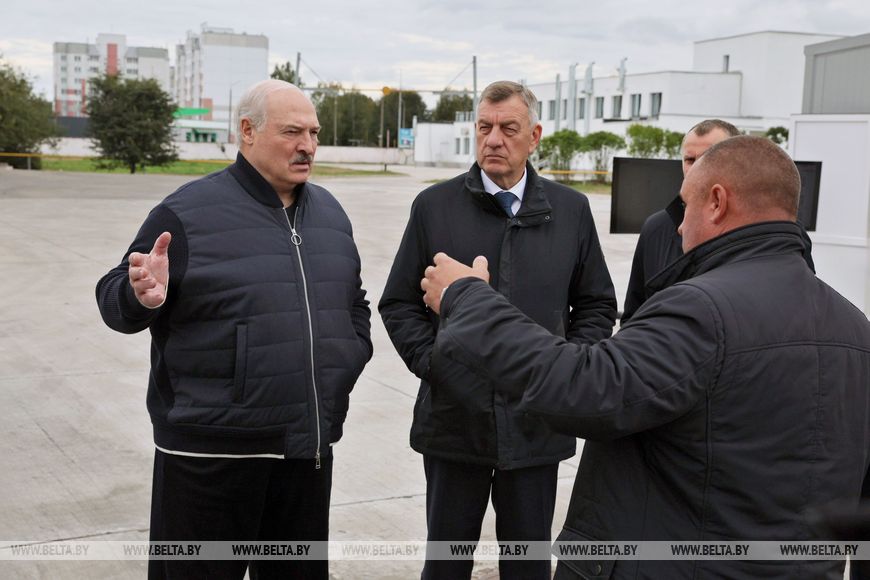
 It runs new automated production lines and operates a process for drying and processing various types of grain, including corn and rapeseed, into compound feed. The facility produces feed for poultry, cattle, and pigs, which significantly increases livestock farming efficiency. Moreover, the raw materials are used not only to make feed but also other by-products. For example, in the course of the production of rapeseed feed, the mill presses rapeseed oil.
It runs new automated production lines and operates a process for drying and processing various types of grain, including corn and rapeseed, into compound feed. The facility produces feed for poultry, cattle, and pigs, which significantly increases livestock farming efficiency. Moreover, the raw materials are used not only to make feed but also other by-products. For example, in the course of the production of rapeseed feed, the mill presses rapeseed oil.

 It runs new automated production lines and operates a process for drying and processing various types of grain, including corn and rapeseed, into compound feed. The facility produces feed for poultry, cattle, and pigs, which significantly increases livestock farming efficiency. Moreover, the raw materials are used not only to make feed but also other by-products. For example, in the course of the production of rapeseed feed, the mill presses rapeseed oil.
It runs new automated production lines and operates a process for drying and processing various types of grain, including corn and rapeseed, into compound feed. The facility produces feed for poultry, cattle, and pigs, which significantly increases livestock farming efficiency. Moreover, the raw materials are used not only to make feed but also other by-products. For example, in the course of the production of rapeseed feed, the mill presses rapeseed oil.
“Very efficiently. Way to go,” Aleksandr Lukashenko remarked.
The president zeroed in on the mill’s raw material supply and profitability and urged the need to strike a reasonable balance between the interests of the enterprise itself (which would prefer to purchase grain at lower prices) and suppliers seeking maximum revenue for their products. “Don't rip off people,” the president asked the director of the mill. “Do not hurt producers either.”
Aleksandr Lukashenko was assured that the mill is operating in the black and receiving raw materials in sufficient volumes. For example, to attract suppliers, the mill uses a system of mutual offsets.
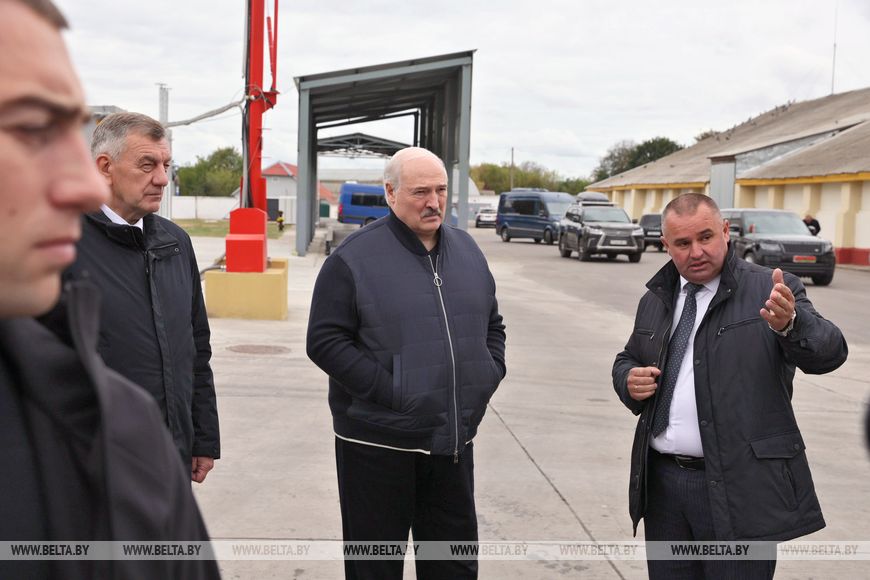 Another aspect highlighted by the president was the importance of meeting the needs of the Shklov District but also of neighboring districts.
Another aspect highlighted by the president was the importance of meeting the needs of the Shklov District but also of neighboring districts.
 Another aspect highlighted by the president was the importance of meeting the needs of the Shklov District but also of neighboring districts.
Another aspect highlighted by the president was the importance of meeting the needs of the Shklov District but also of neighboring districts.
"The modernization of the administrative complex on the grounds is now nearing completion. It will include a café that will be open to everyone. “You've done everything nicely. If there is something else you need to do, perhaps we might help with some things. If something is good for people, if it generates income, it should be done,” the head of state said.
“Everything looks nicely,” the president said. “Unlike Gorodets, this complex looks decent. It's done wisely. Perfectly.”






